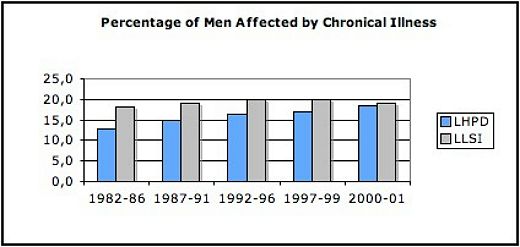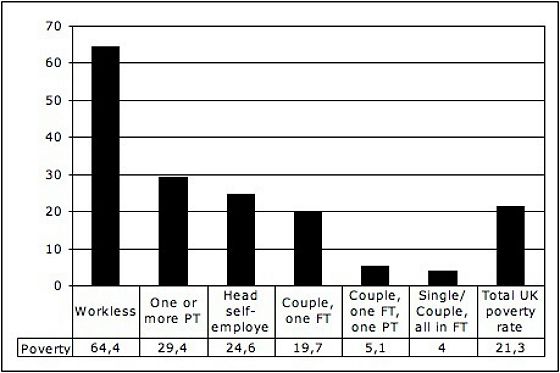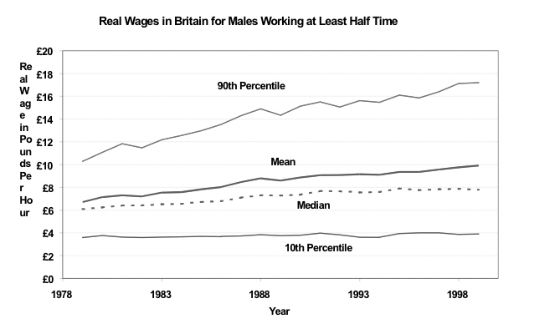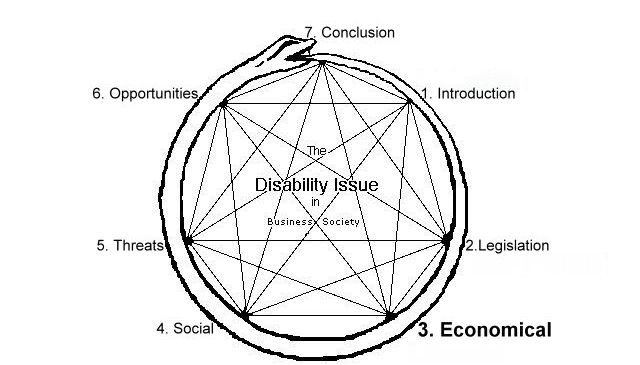|

3.1 The Labour Market and UK Poverty
In the past, invalidity benefits were considerably higher compared to unemployment benefits. Additionally the 'pull-factor' is minimal, which means that people don't get pressure from the government to look for work once they are in the invalidity or incapacity benefit system. Only 5% of those reported unable to work over long-term because of illness, are looking for a job. "The upshot of all this was that the number of male invalidity benefit claimants doubled from early 1980s to the mid-1990s." (Nickell 2003 p.18-19)
The figures for general disability remained constant, whilst figures for directly work related long-term sickness were increasing. (4.)

Graph 2: Percentage of Men affected by Chronic Illness (Source: Nickell 2003)
In fact only about 2% of these people, who are on incapacity benefit, go back to work (Daniel 1996). Disabled people have become big net recipients of state benefits.
Disabled people are claiming for 'fostering accessibility'.
"If there was a barrier-free transport system, one could argue, that disabled people don't experience mobility disadvantage and therefore wouldn't need mobility benefits. It might be the same for the labour market." (Daniel 1996)
Disability Right Fighters have focused on improving the level of benefits and, more recently, on types of benefits which reduce the sense of dependency. That is
"(…) why cash benefits such as the disability living allowance are so aggressively against moves to replace them with services in kind. Disabled people value the cash because it allows them to make their own choices about their needs." (Daniel 1996)
Today most benefits disabled people receive, are in form of money in order to give them the opportunity, to make their own choices and allow them to conduct a normal life style. Yet, the definition of normal life style often includes work.
However, the benefits are not used, to improve the chances to get a job. From a philosophical perspective, this argument detects the harming impact of cash-benefits on the economy. The reference in this context is to Schopenhauers' 'Bondage of the Will':
"Schopenhauer distinguishes the freedom of acting from the freedom of willing, affirming the former while denying the latter. He portrays human action as thoroughly determined but also argues that the freedom which cannot be established in the sphere of human action is preserved at the level of our innermost being as individuated will, whose reality transcends all dependency on outside factors." (Zöller 1999)
Over a short-term, this means that cash-benefits are wanted, but might not satisfy long-term:(5.) Most people who experience poverty are depending on state benefits. (6.) (7.)

Graph 3: Poverty with Different Employment Circumstances - UK 2000/1
(Source: Piachaud & Sutherland 2002) (Appendix 2: UK Poverty)
"Poverty in Britain has increased dramatically since 1979. Alongside high levels of poverty, Britain also has particularly large number of working-age 'workless households'; quite surprising in view of the relatively high employment rate." (Nickell 2003 p.1)
In the prime group, around 70% of the inactive people, report themselves as sick or disabled. (Nickell 2003 p.14) "The proportion of people living in working age household who are poor rose from 13% to 26% between 1979 and 1999." (Nickell 2003 p.4) The policy therefore is, change and implement more factors, which make work reasonable. The fact that disability across the population is exploding, is important. There might be various reasons for this, such as
- Acceptance of disability in society
- Living standard as invalidity benefits are higher than unemployment benefits
- Softening society, as people after decades of well-being become delicate.
In fact, going back to work requires high emotional effort, as the living standard might decrease through more action and stress.
The consequences are, a weakening labour market for the unskilled with relative falling wages and jobs are harder to come by. (8.)
"However, the difficulties involved in getting young people with weak skills into employment are relatively minor relative to the problem facing, for example, those with disabilities and their caseworkers and advisers." (Nickell 2003 p.24)
The group who suffers, or potential suffers, from long-term illness or disability, is additionally limited in the sort of work they can do. Therefore, we find that the rise in inactivity among men is
"(…) heavily concentrated among those with chronic illness, particularly if they are claiming incapacity benefit." (Nickell 2003 p.17)
To overcome the lack of skills, education is necessary. However, the government budget for education is shrinking.
"1998-2000 were the years with the lowest public expenditure in the last quarter of the 20th century (4,5% of GDP)" (Nickell 2003 p.52)
Education becomes a luxury good. Therefore, the increase in wage dispersion will increase further, as the trend already indicates.
 Graph 4: Real Wages for Male working at least Half Time (Source: Nickell 2003)
Graph 4: Real Wages for Male working at least Half Time (Source: Nickell 2003)
"Some policies, such as job training programs, assist people in finding employment." (Mankiw 1992) But this does not necessary apply for disabled, as stated in an example from Germany. (Appendix 3: BA)
top -
next
4. Footnote:
"LLSI refers to a limited long-standing illness. This is reported in the GHS, where people are asked if they suffer from a long-standing illness which limits things which they would normally do. LHPD refers to a limited health problem or disability. This is reported in the LFS and refers to a health problem or disability which affects the kind of work the person does." (Nickell 2004 p.47) Back to Context
|
5. Footnote:
Schopenhauers work is widely interpretable, and is therefore a generator for many modern philosophers. This link is based on an Einstein Quotation, which quotes Schopenhauer. (Fantastischen Vier, Die 1996 - Translation 1) Back to Context
|
6. Footnote:
The poverty level typically used, is 60% of median earnings. (Nickell 2003 p.3) Back to Context
|
7. Footnote:
Whilst poverty is measured in terms of money, it is not just about money. Almost everything which is perceived as bad, poor people seem to be particularly affected by it: More illness, more accidents, more crime, fewer opportunities for their children and the most expensive credits. Back to Context
|
8. Footnote:
This is caused by rising demand for skilled workers, while unskilled workers got increasingly competition in recent years such as
- the technology progress is biased against unskilled workers and in favour of skilled workers and
- Less developed countries are unbeatable in price in the unskilled sector.
(Nickell 2003) Back to Context
|
|


